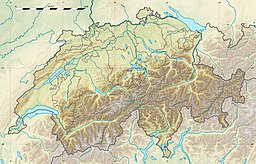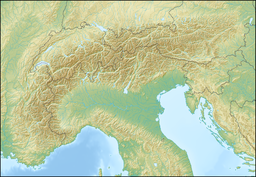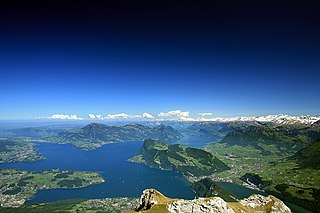
Lake Lucerne is a lake in central Switzerland and the fourth largest in the country.

World Rowing, also known as the World Rowing Federation, is the international governing body for rowing. Its current president is Jean-Christophe Rolland who succeeded Denis Oswald at a ceremony held in Lucerne in July 2014.

Frances Houghton MBE is a 5 time Olympic rower (2000–2016), 4 times World Champion and 3 times Olympic Silver medallist.
The 2001 World Rowing Championships were held from 19 to 26 August 2001 at Rotsee in Lucerne, Switzerland.
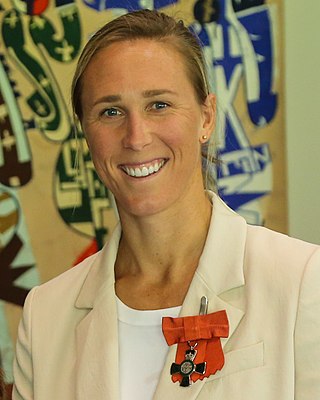
Emma Kimberley Twigg is a New Zealand rower. A single sculler, she was the 2014 world champion and won gold in her fourth Olympics in Tokyo in July 2021. Previous Olympic appearances were in 2008, 2012, and 2016. She has retired from rowing twice, first for master-level studies in Europe in 2015 and then after the 2016 Olympics, disappointed at having narrowly missed an Olympic medal for the second time. After two years off the water, she started training again in 2018 and won silver at the 2019 World Rowing Championships. Since her marriage in 2020, she has become an outspoken advocate for LGBT athletes. At the 2020 Summer Olympics, Twigg won gold in the woman's single scull. At the 2024 Summer Olympics, Twigg won Silver in the same event.

Helen Glover is a British professional rower and a member of the Great Britain Rowing Team. Ranked the number 1 female rower in the world in 2015–16, she is a two-time Olympic champion, triple World champion, quintuple World Cup champion and quintuple European champion. She and her partner Heather Stanning were the World, Olympic, World Cup and European record holders, plus the Olympic, World and European champions in the women's coxless pairs. She has also been a British champion in both women's fours and quadruple sculls.

Heather Mary Stanning OBE is a retired British professional rower. As a member of the Great Britain rowing team, she is a double Olympic champion, double World champion, quadruple World Cup champion and double European champion. She has also been a British champion in both women's fours and quad sculls.

The rowing competitions at the 2012 Olympic Games in London were held from 28 July to 4 August 2012, at Dorney Lake which, for the purposes of the Games venue, was officially termed Eton Dorney. Fourteen medal events were contested by 550 athletes, 353 men and 197 women.
The 1982 World Rowing Championships were World Rowing Championships that were held from 28 to 29 August 1982 at Rotsee in Lucerne, Switzerland.

Eve Macfarlane is a New Zealand rower. Described as a "natural rower", she went to the 2009 World Rowing Junior Championships within a few months of having taken up rowing and won a silver medal. She represented New Zealand at the 2012 Summer Olympics in London as the country's youngest Olympian at those games. She was the 2015 world champion in the women's double sculls with Zoe Stevenson. At the 2016 Summer Olympics, they came fourth in the semi-finals and thus missed the A final.
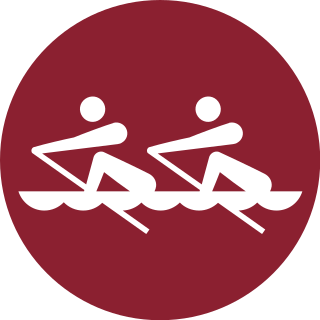
The rowing competitions at the 2020 Summer Olympics in Tokyo took place between 23 and 30 July 2021 at the Sea Forest Waterway in Tokyo Bay. Fourteen medal events were contested by 526 athletes.

Michael Brake is a New Zealand rower. He is a dual Olympian and won Olympic gold at Tokyo 2020.
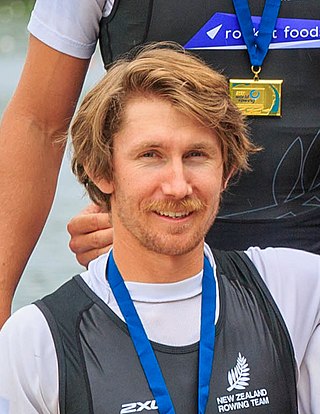
Thomas James Murray is a New Zealand rower. Born and raised in Blenheim, he is a member of New Zealand's national rowing team and has competed in the eight and in the coxless pair. In the smaller boat, he has medalled in two World Rowing Championships; bronze in 2017 and silver in 2019. At the 2016 Rio Olympics, he competed with the eight and won gold in the same boat class at the 2020 Tokyo Olympics. Murray has won four consecutive premier national titles in the coxless pair. He has been world champion in age group rowing events three times.

Brooke Francis is a New Zealand rower. She has twice won the world championship in the double scull alongside Olivia Loe, is the incumbent world champion, and won a silver medal in this class at the 2020 Tokyo Olympics with rowing partner Hannah Osborne, followed by a gold medal at the 2024 Paris Olympics with Lucy Spoors. As of 2021, she has won ten premier national rowing championships.
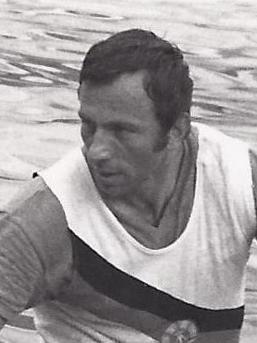
Götz Draeger, sometimes incorrectly referred to as Dräger, is a German rower.
Christof Kreuziger is a German rower. He won gold medals for East Germany at the 1973 European Rowing Championships and the 1974 World Rowing Championships in double scull, and at the 1975 World Rowing Championships in quad scull.
The 1947 European Rowing Championships were rowing championships held on the Rotsee in the Swiss city of Lucerne. The competition was for men only, they competed in all seven Olympic boat classes, and 15 nations participated. It was the first European Rowing Championships held after World War II, and it was the second time that the regatta was held on the Rotsee; the previous regatta was in 1934.
The 1926 European Rowing Championships were rowing championships held on Lake Lucerne in the Swiss city of Lucerne. The competition was for men only and they competed in all seven Olympic boat classes.
This article details the qualifying phase for rowing at the 2020 Summer Olympics. The majority of the spots were awarded to the National Olympic Committees, not to specific athletes, at the 2019 World Rowing Championships, held in Ottensheim, Austria from 25 August to 1 September 2019. At the World Championships countries qualify boats rather than crews and can make crew changes for the Olympic regatta for qualified boats. Further berths are distributed to the nations at four continental qualifying regattas in Asia and Oceania, Africa, Latin America, and Europe. The last berths were distributed at the Final Olympic Qualification Regatta held in Lucerne, Switzerland 15–16 May 2021.
Phoebe Spoors is a New Zealand rower. From Christchurch, she was an unused reserve in the New Zealand women's eight at the 2020 Tokyo Olympics in which her elder sister Lucy won a silver medal. In an unusual career progression for a New Zealand rower, she never represented the country as an age-group rower but joined the national team after several years in the United States for fulltime rowing at the University of Washington combined with tertiary study.



